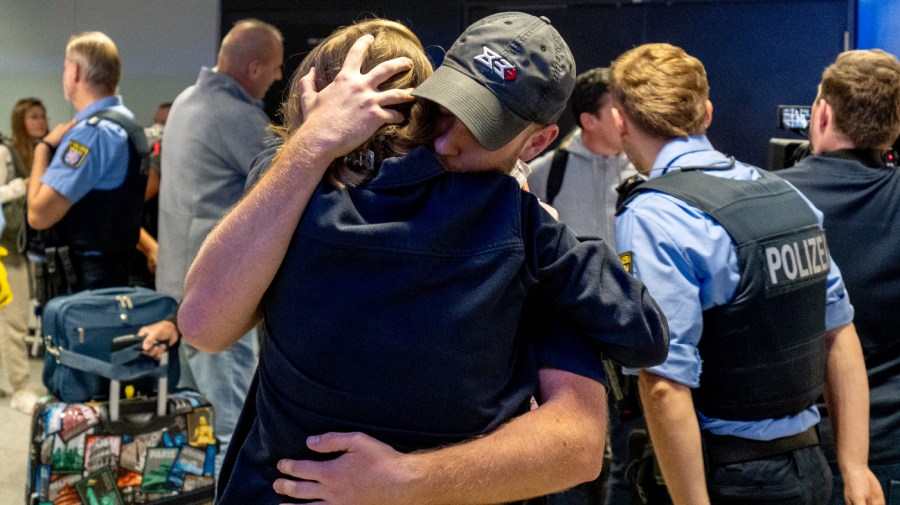International News | The Hill
The Israel-Hamas war is causing U.S. schools to pull their students out of study-abroad programs in the area, while Israeli students in the U.S. are looking to return home to be with family and in many cases join the fight with the military.
Multiple American universities have set up flights for students to get out of Israel after the initial attack by Hamas and ensuing retaliation from Israel, which between them have left hundreds dead on both sides, including at least 27 U.S. citizens.
Northeastern Global News announced that Northeastern University already evacuated three students who were in Israel at the time of the attack. Jesse Ruigomez and Keren Doherty were finishing co-ops in Israel, and fellow student Joshua Einhorn was visiting friends and family for the Jewish holiday Simchat Torah when the attack occurred.
“Fortunately, I was in central Israel and not in the south where things are really bad since they were using short-range rockets,” Ruigomez told the outlet. “I was safe, but it’s a horrible situation all around.”
The University of California on Thursday would not disclose the number of students in Israel for safety reasons but says the majority of those in its study abroad program have left and it is working with the rest of the students still in the country to arrange their departures.
The University of Delaware is working to get one student studying in Israel back to the U.S. by the end of the week and has canceled an alumni trip to Israel that was supposed to take place at the end of the year, according to a university spokesperson.
And one student at the University of Massachusetts at Amherst was supposed to start classes at Hebrew University on Oct. 15 and was traveling in Jordan at the time of the attack. The school said “arrangments were made for him to fly home” and no other students from the school are in Israel.
The urgency to get students out of Israel comes as the State Department raised the travel advisory to Israel to level 3 — meaning people should reconsider travel to the country — and the Biden administration is working to schedule charter flights to get Americans out.
“So, beginning tomorrow, the United States government will arrange charter flights to provide transportation from Israel to sites in Europe,” John Kirby, a White House spokesperson on national security issues, said Thursday.
Back in the 2019-2020 academic year, the State Department recorded 1,893 U.S. students who went to Israel to study for college credit.
Uttiyo Raychaudhuri, vice provost for internationalization at the University of Delaware, told The Hill on Thursday that communications with partners such the State Department have a direct impact on how the school chooses when it is time to bring back students from countries.
“When this happens, we look to our intelligence sources such as International SOS, the Department of State, our peer institutions, other government’s reactions, and our internal experts to make the difficult decision to remove our travelers from unsafe environments. The decision is not made lightly, but our duty of care is to put safety first while considering all options,” Raychaudhuri said.
For U.S. colleges, having to cancel programs in Israel or get students out of the country quickly is not a new phenomenon, as conflicts between the nation and various Palestinian and Arab groups have raged for decades.
Back in 2014, numerous universities pulled their students out of Israel during Gaza clashes.
But even as U.S. schools are racing to get students out, Israeli students are heading in the opposite direction, in some cases because the Israeli government has called up around 300,000 citizens on military reserves to become active. All young Israelis, with some exceptions, are required to join the Israel Defense Forces (IDF).
Hadar Hazony, a PhD student at the University of Notre Dame, has received temporary leave from his department to go back to Israel, where he says he plans to volunteer to join the military.
“I am not currently drafted. I don’t expect to be drafted. I will try to volunteer in any way I can, whether that’s in civilian applications or whether that’s in some kind of military situation,” Hazony told The Hill.
He does not know of any other students in his situation, saying Israeli undergraduates studying abroad at the school would lose their entire semester if they left this moment.
“The program has been very understanding with the situation and they understand that I need to go there. But, if you’re undergraduate and you’re only here for one semester, and you’re halfway through the semester, if you go back now you’re gonna lose the entire thing.”
CNN talked to a 22-year-old Israeli named Ben, withholding his last name for safety reasons, as he went back to Israel after the attack to be on standby if the IDF needed him to serve as a reservist in a reconnaissance unit.
“It feels really hard to be so far away and there isn’t much you can do,” Ben told CNN before his flight home. “You’re worried about the people there and all you do all day is watch the news and look at your phone. It’s impossible to be away right now.”
While Hazony said the reaction to the war by his university’s president was an “embarrassment,” his immediate department and colleagues have been “extremely supportive” as he prepares to leave Sunday.
“It’s a privilege to be an Israeli and to be a Jew. And it’s a privilege to have a country to go home and it’s true that horrific things happened, but I’m grateful that there is something that I can give to. I’m grateful that there is a place I can go to,” Hazony said.
Author Profile
Latest entries
 HeadlinesSeptember 18, 2024Fun Facts: You would have to click a computer mouse 10 million times to burn a single calorie
HeadlinesSeptember 18, 2024Fun Facts: You would have to click a computer mouse 10 million times to burn a single calorie ScienceSeptember 18, 2024Breast milk antibodies protect against rotavirus
ScienceSeptember 18, 2024Breast milk antibodies protect against rotavirus HeadlinesSeptember 18, 2024Top 5 Diddy indictment bombshells: What legal experts predict for future of fallen music mogul
HeadlinesSeptember 18, 2024Top 5 Diddy indictment bombshells: What legal experts predict for future of fallen music mogul ScienceSeptember 18, 2024Low levels of 1 mineral can make IBD worse
ScienceSeptember 18, 2024Low levels of 1 mineral can make IBD worse

